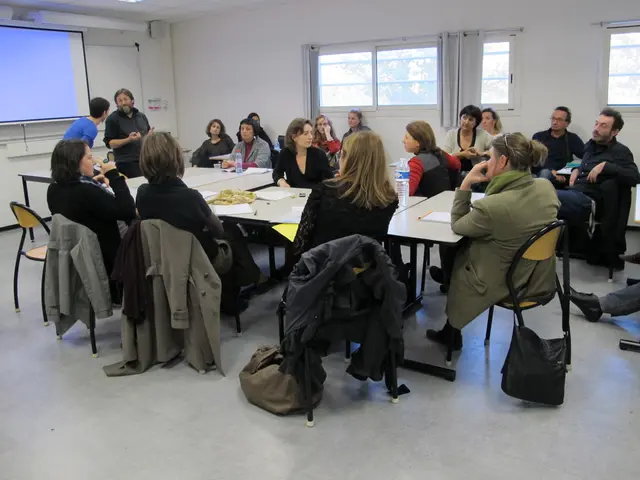Interview: Alexander Scheer on Power, Persistence, and Personal Growth
"Individual Exhibits Monstrous Behavior"
TV, film, music - he's done it all. Alexander Scheer, the multi-talented artist, has made a name for himself in the world of entertainment, having been nominated for two German Film Awards this year. In this candid interview, we delve into his double nomination, the significance of resilience and liberation on screen, and his continued exploration of diverse roles.
Congratulations on your double nomination! Let's start by discussing your two roles. What does it feel like?
S. - Well, I'd be lying if I said I wasn't thrilled about it. It's a bit overwhelming, to be honest. It's like having a pair of jumbo-sized shoes to fill.
Can two great supporting roles rival one mediocre leading role?
S. - That's an interesting question. For me, it's not about the label. I'm proud of every role I've had the chance to play, no matter the size. There's always something to discover, something new to learn.
Both films feature strong female characters at their core. What about these roles drew you in?
S. - Character nuances, story arcs, and the chance to bring depth to a character - that's what fascinates me. I think it's crucial for our industry to tell stories that emphasize empathy, mutual respect, and the power of resistance.
Speaking of resistance, these projects were created by men. What do you think about that?
S. - It's a challenging topic, for sure. At its core, it's about listening to each other, learning from each other, and ensuring that everyone has a voice. We need to promote diversity in our industry, both on and off-screen, because every perspective matters.
In 'In Love, Yours, Hilde', you played a prison chaplain. What made the character resonate with you on a personal level?
S. - Resistance stories, as difficult as they may be, are essential to tell. I think it's important to remember the past, learn from it, and find ways to grow collectively. My great-uncle's experiences during the Nazi era played a role in my connection to this character, as he also posed as a member of a resistance group.
Your second nomination brought you the role of Manfred Eicher in 'Cologne 75'. Do you have a personal or professional connection to this figure or jazz in general?
S. - I've always been drawn to the convergence of music and film. Playing a music producer was a fantastic opportunity to explore that space, and Manfred Eicher's influence on the international jazz scene is remarkable. I found the process deeply fulfilling.
In a nutshell, how did you approach the character of Manfred Eicher?
S. - I believe that in many cases, it's not just about the words you say but the ones you don't. The energy, the atmosphere, and the relationships between the characters were crucial components of Manfred Eicher's character. It was all about capturing the essence and the spirit of the man.
Over the years, you've taken on roles depicting real people. How does that influence your approach to a character?
S. - I find tackling roles based on real individuals both intriguing and challenging. It's like having half of the story already written; your job is to piece together the missing pieces and make the character come alive.
You've worked with Andreas Dresen numerous times. Why is continuity essential to you as an artist?
S. - I'm a strong believer in collaboration and having the chance to build upon established relationships. Working with people I trust and feel comfortable with allows me to be more open and creative. It creates a special synergy that, in my opinion, is essential for delivering strong performances.
Last but not least, you're currently embodying David Bowie in 'Heroes' at the Berliner Ensemble. How did you prepare for such an iconic and intimidating role?
S. - I approached it with trepidation, to be honest, but also with excitement. I knew I had an opportunity to pay tribute to a true legend and my personal hero. I studied Bowie's music, watched interviews, and immersed myself in his world in an effort to do justice to the character. It was both a labor of love and a daunting task.
Do you still experience stage fright before performances?
S. - Absolutely. Stage fright is a perpetual companion for any performer, I believe. It keeps you focused, on your toes, and ready to deliver your best. I wouldn't have it any other way.
- Alexander Scheer's double nomination in television and film award ceremonies has been an overwhelming experience, feeling like wearing a pair of jumbo-sized shoes to fill.
- For Alexander Scheer, the significance of portraying strong female characters in movies-and-tv doesn't rely on the label of a leading or supporting role, as long as he has the chance to discover something new and learn.
- In the film 'In Love, Yours, Hilde', Alexander Scheer's role as a prison chaplain resonated with him on a personal level due to his great-uncle's experiences during the Nazi era and the importance of resistance stories.
- In playing the character of Manfred Eicher in 'Cologne 75', Alexander Scheer appreciated the opportunity to explore the convergence of music and film, and found the process deeply fulfilling due to Manfred Eicher's remarkable influence on the international jazz scene.







